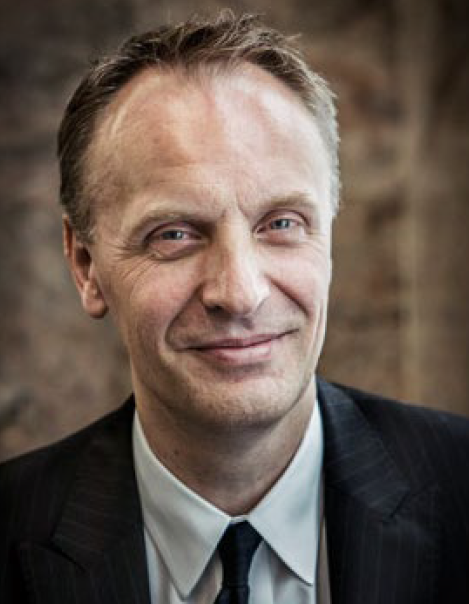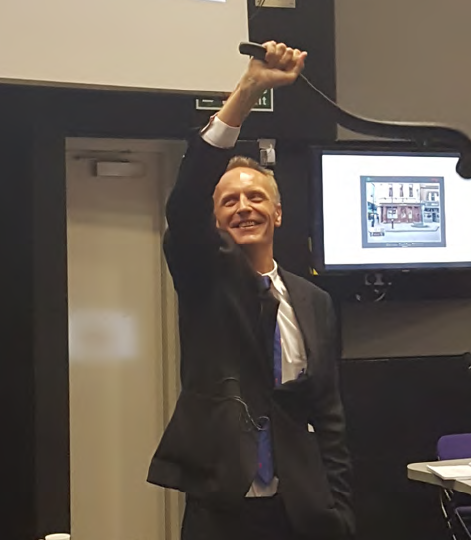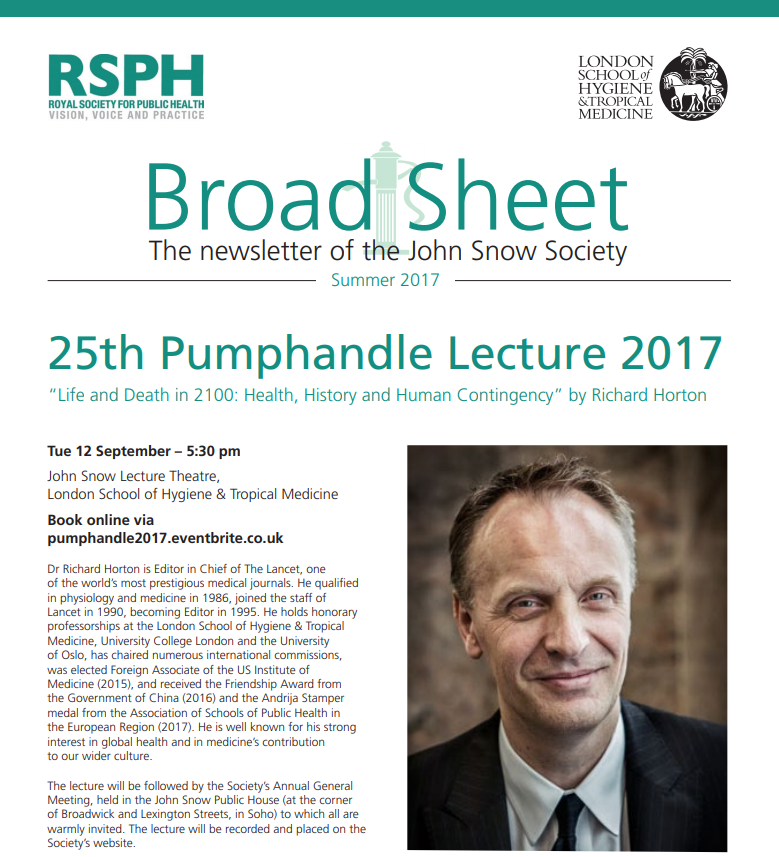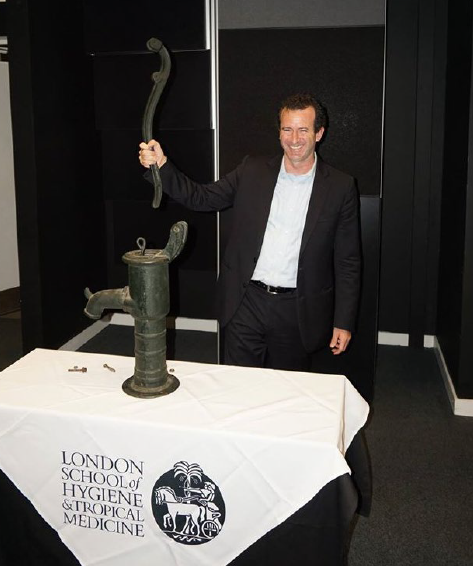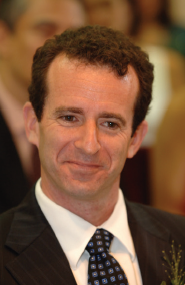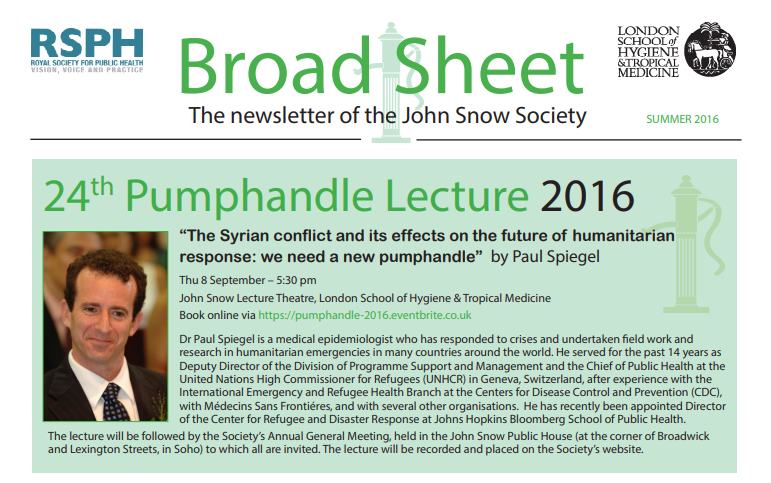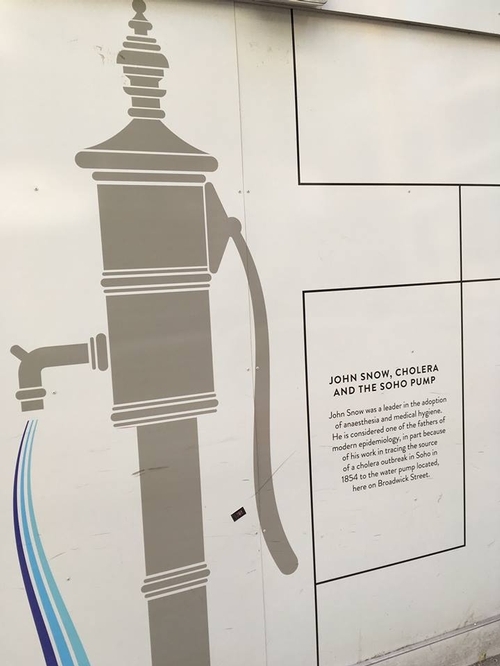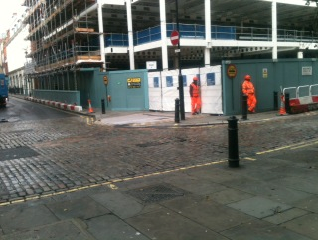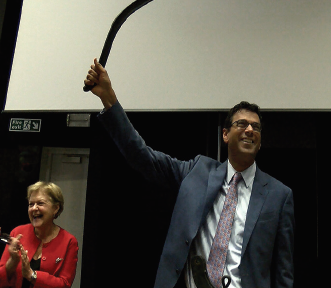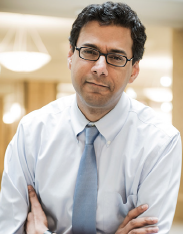April 19th 2018 from 7.45pm at Paper Dress Vintage, 352a Mare St, London E8 1HR
2017 Dr Richard Horton – Life and Death in 2100: Health, History and Human Contingency
The 25th Annual Pumphandle Lecture was delivered on 12th September 2017, by Dr Richard Horton, Editor in Chief of The Lancet.
This was a broad and passionate critique of global heath and today’s world. Dr Horton began by emphasising a fundamental principle of evolutionary biology which guides selection for altruistic behaviour: “rB>C” where r is relatedness, B is benefit and C is cost. In effect the more distantly related are two individuals, then the greater the benefit must be of an action if it is to be worth doing (ie to exceed its cost). He then reviewed the contrast between techno-utopian (ever increasing healthy life expectancy, robots for everything…) versus the dystopic (2
billion climate refugees by 2100, unsustainable environments, heightened extinction risks…) visons of our future, and related this to historical trends, in particular the evolution from the optimism of the 17th century enlightenment, to the desperate circumstances of urban environments in the early industrial revolution and political reaction, to the consequent anger and despair of the romantic movement. References to Aimee Cesaire,
Francis Bacon, John Rawls and Amartya Sen were cited to illustrate these tensions and point to the importance of dialogue and communication between peoples.
At this point our speaker referred to his own experience as editor of a major journal, which publishes much in the area of global health, and regretted that so much of the reality of the contemporary communication industry was concerned with survival and impact factors and profit and competition, with too little concern for purpose and meaning of the larger enterprise. Too much concern for human rights which focuses upon our rights over others… too much focus upon the extremism of others but not of ourselves… too much concern over the “post truth” world without sufficient concern for the brutal facts of the lives of others.
Turning to solutions he referred to the usual calls for equity and the right to health … but stressed the overall importance of solidarity, or the degree of social cohesion – hence returning to his original reference to rB>C, stressing the importance of relatedness and the need to expand this beyond simple genetics to all humanity. We in the health professions have much to contribute, as health is one of the greatest levers for creating solidarity between all peoples. This is turn will require moving beyond simple objective descriptions of our subjects
and study participants, as in so much contemporary research, to sympathetic appreciation of the plight of others and of our common humanity. To help meet this challenge he announced that The Lancet would start a new series exploring personal experiences.
He concluded by referring to the great romantic William Blake, who was born very near to the Broad Street pump, and who noted that “what is now proved was once imagined”.
The vote of thanks was proposed by Professor Jimmy Whitworth, and Dr Horton was invited to remove the handle of the pump to close the proceedings. Society Members then adjourned to the John Snow Pub in Soho for the Annual General Meeting of the Society.
2017 Broadsheet now available to read
This year’s Broadsheet is now available
Featuring:
Pumphandle lecture 2017
24th Pumphandle lecture and AGM 2016
Updates on the missing pump
Reports from Chapters of the Society
Other news
2016 Pumphandle Lecture & AGM
Paul Spiegel on the need for a new pumphandle in humanitarian crisesThe society is proud to have hosted Paul Spiegel with his lecture on “The Syrian conflict and its effects on the future of humanitarian response: we need a new pumphandle”. A record number of ticket reservations for this event was recorded. As usual, the lecture was followed by the AGM in the John Snow pub, this time with a truly memorable 54(-ish) words interactive song on John Snow, stated for the successful application for membership of the J3SC.
2016 Dr Paul Spiegel – The Syrian conflict and its effect on the future of humanitarian response: We need a new pumphandle
The 24th Annual Pumphandle Lecture was delivered on 8th September 2016, by Dr Paul Spiegel, recently appointed Director of the Center for Refugee and Disaster Response at Johns Hopkins Bloomberg School of Public Health. Previous to this appointment, Dr Spiegel had spent 14 years as Deputy Director of the Division of Programme Support and Management and Chief of Public Health at the United Nations High Commissioner for Refugees (UNHCR) in Geneva.
Dr Spiegel began by referring to the large numbers of refugees and displaced persons in the world today – the
largest numbers since the Second World War, with the majority coming from Syria, Afghanistan and Somalia.
He commented on the history of such humanitarian crises in recent decades, from Biafra in the 1960s to Cambodia in the 1970s to the many states in crisis today. Circumstances have changed considerably over the years both in the nature of the crises and countries where they take place, and the various institutional responses. Much of the data come from refugee camps, and it has been difficult to quantify populations affected but not in camps. Crises have become protracted and health problems have shifted from a focus on communicable disease to a wide variety of health problems including those associated with middle income populations such as in Syria. New agencies have arisen, several within the UN but many with other international, national or local bases. Recently several Islamic agencies have become involved, and there is a move for private sector involvement. Coordination of all these agencies has posed problems and it is recognised that decision-making has not
always been optimal, having to be made on imperfect data in a complicated political context.
He devoted much of the lecture to expanding details on five recommendations he considered essential for the improvement of responses to such crises. First is the need to “Operationalise the concept of centrality of protection”, recognising the priority to provide a safe environment for people but appreciating the complexity of this challenge. Second is the need to “Integrate affected persons into national health systems” making use of the talent and experience of the displaced persons. Third is a need to “Remake, not simply revise leadership and coordination”. He argued that the WHO has justifiably held a central position on the global stage but that it has failed repeatedly in recent years – it must repair its structures and procedures soon, or lose its central position. Fourth is the need to “Make interventions more efficient, effective and sustainable” which has many implications, including the need to move from annual budgets and short term thinking to recognition of need for long term infrastructure and the importance of education and livelihoods for societies if they are to survive and prosper.
Finally he referred to the need for “Data and research to improve outcomes and impact”. The need for effective
evidence-based decision-making is obvious – but this requires systematic collection and critical analysis of data in order that the required evidence can accumulate. He referred in particular to the Wellcome Trust / DfID R2HC initiative (on “Research for Health in Humanitarian Crises”) which is encouraging rigorous research on this group of problems. Dr Spiegel closed by referring to what he called the “forgotten emergencies” in countries such as South Sudan and Central African Republic, which have been crowded off the global agenda because of the magnitude and urgency of the crises in and around Syria. The world has failed both in allowing these circumstances to arise, and in responding to them. Something new is required to deal with these immense
problems– a new pumphandle.
The vote of thanks was proposed by Professor Jimmy Whitworth, and Dr Spiegel was invited to remove the handle of the pump to close the proceedings. Society Members then adjourned to the John Snow Pub in Soho for the Annual General Meeting of the Society.
2016 Broadsheet now available to read
This year’s Broadsheet is now available
Featuring:
- Pumphandle lecture 2016
- Reports from Chapters of the Society
- Updates on the missing pump
- Other news
Blessed Chloroform Lecture free for members
‘The Society of Anaesthetists: a Methodological Approach to its History’ – John Snow Society members invited to join lecture for free.
Members of the John Snow Society are invited to join the lecture from the History of Anaesthesia Society on ‘The Society of Anaesthetists: a Methodological Approach to its History’ for free. This Blessed Chloroform Lecture will be delivered at their annual meeting to be held just outside Oxford at the Hawkswell House Hotel on Saturday 2nd July at 11.30 am.
The Blessed Chloroform Lecture does not require booking – the History of Anaesthesia Society’s other lectures during their Oxford Meeting will be charged at the normal rate and require booking and payment: http://www.histansoc.org.uk/events.html
Pump due to return
Latest update on when the pump may be reinstated
Westminster City Council have advised that the pump may be reinstated in around six months’ time, and we are hopeful that it will be replaced near the pub.
As shown in the photograph, an image of the pump is currently displayed on the pub hoarding whilst the real pump is stowed safely in a crate.
Where’s the pump?
Pump due to feature on a hoarding
Watch this space near the John Snow pub; an image of the pump is due to appear on nearby hoarding while we await the return of the statue of Snow’s pump which was removed in January during construction work
2015 Atul Gawande – On removing the pumphandle: innovation and implementation
The 23rd annual Pumphandle Lecture was given on the 8th of October 2015 by Dr Atul Gawande, Professor of Surgery and of Public Health at Harvard, well known author (eg The Checklist Manifesto and Being Mortal), and Executive Director of Ariadne Labs, a joint centre for health systems innovation, as well as Chairman of
Lifebox, a UK-based nonprofit devoted to making surgery safer globally.
Dr Gawande began by referring to Snow’s work on cholera, and the subsequent evolution of the complex health care systems of today.
He highlighted the effectiveness of a simple checklist approach in three key areas – surgery, maternal and childcare, and primary healthcare – emphasising that a checklist is not a protocol, but a list of the most common things that experts miss, and which should be tailored for particular activities and institutions.
Drawing from experience in the airline industry, the checklist approach was adapted by Dr Gawande’s team and
recently introduced, first in surgical practice. The explicit checking of a list of just 19 items, in theatre, has led to
important reductions in surgical mortality in many countries. He emphasised the necessity of monitoring the system through setting targets, continued contact and data feedback.
In the case of maternal and child health, he emphasised the importance of identifying a set of ”minimum required guidelines” and the collection of data to identify what is missing in the real world. He described
studies in areas of India where one in 20 newborns die in utero or soon after birth. Critical analysis led to agreement on a series of actions before admission, during birth, after birth and when the mother was being discharged. Improved results were not from additional skills training or supplies but the use of a 30-item checklist at different stages.
In assessing primary healthcare, it is common to consider four S categories: staff; stuff; structure and systems.
However, users typically ask about four C’s: contact (is there a place to go that is open); continuity (do staff recall medical histories); coordination (is information transmitted to add to wider public health discussion) and comprehensiveness (can a primary healthcare institution take care of the majority of medical needs). To address these concerns, Dr Gawande and colleagues have recently launched the primary healthcare performance
initiative, which has been approved by the UN General Assembly, in order to identify which is the simplest system to follow to close the gap between aspiration and achievement.
All these are examples of innovative ways by which to remove crucial pumphandles confronting public health.
The vote of thanks was proposed by Professor Dilys Morgan, using a checklist, and Dr Gawande was invited to remove the handle of the pump to close the lecture. Society members then adjourned to the John Snow pub in Soho for the Annual General Meeting of the society.


